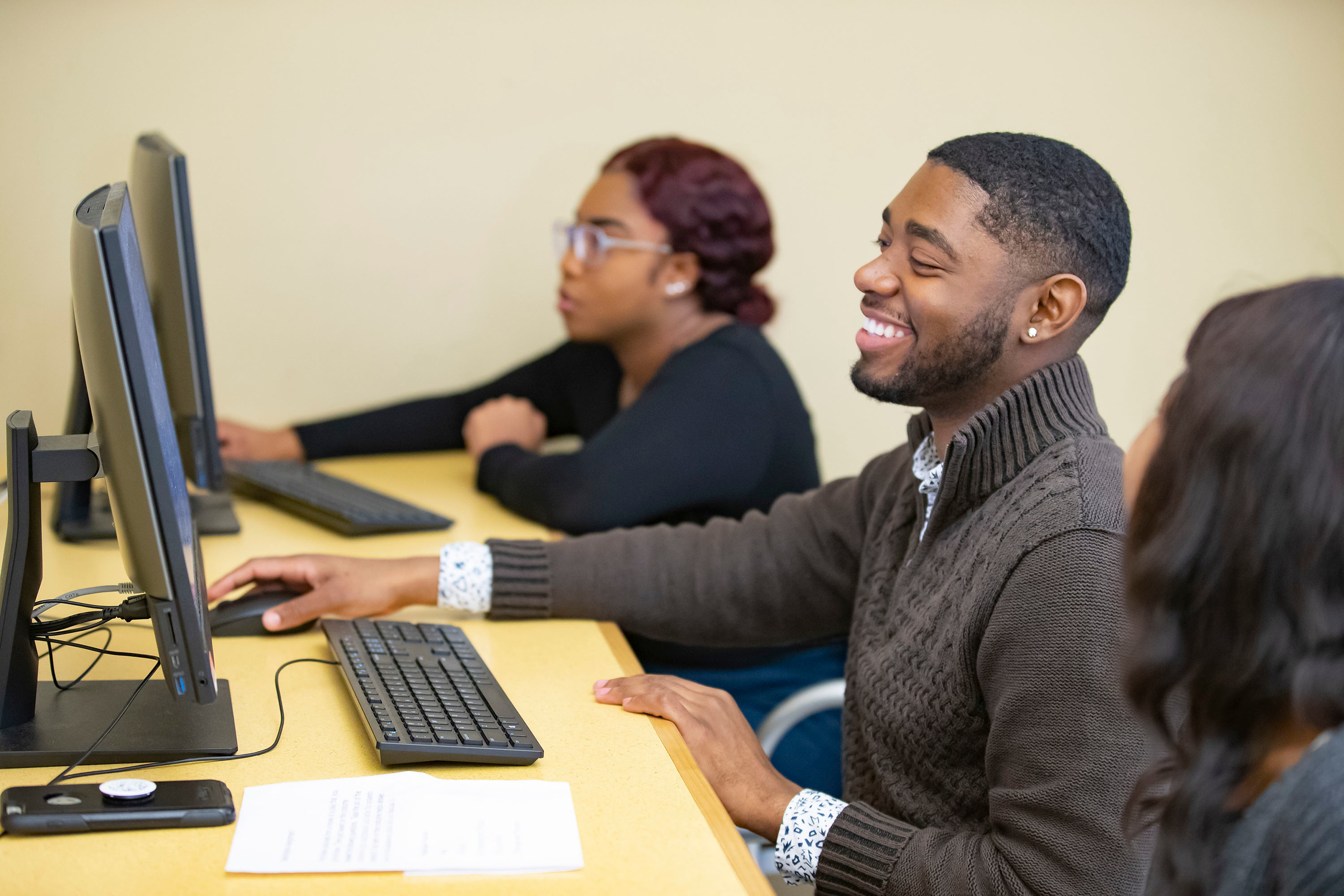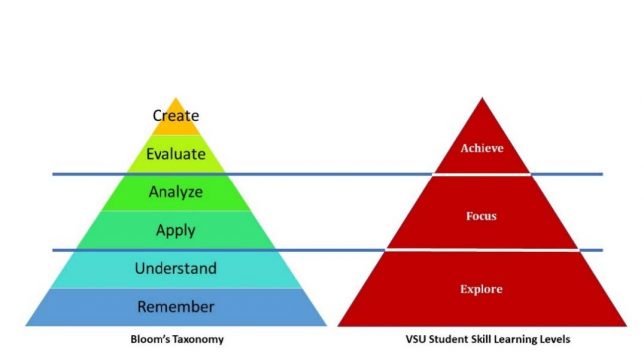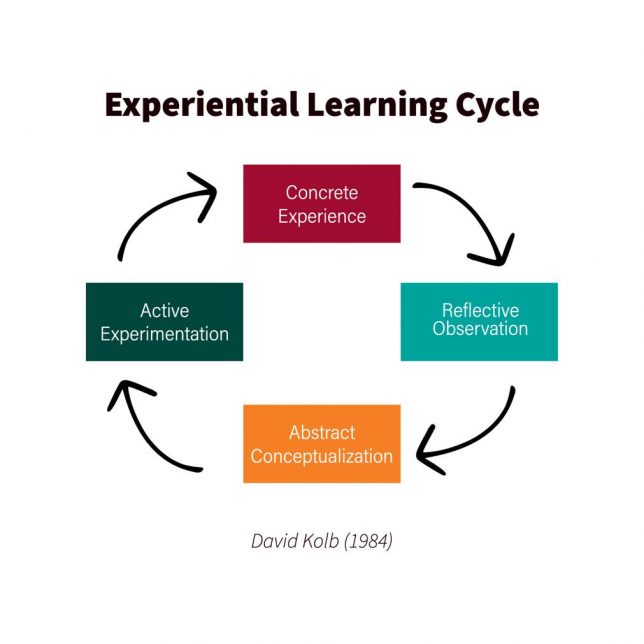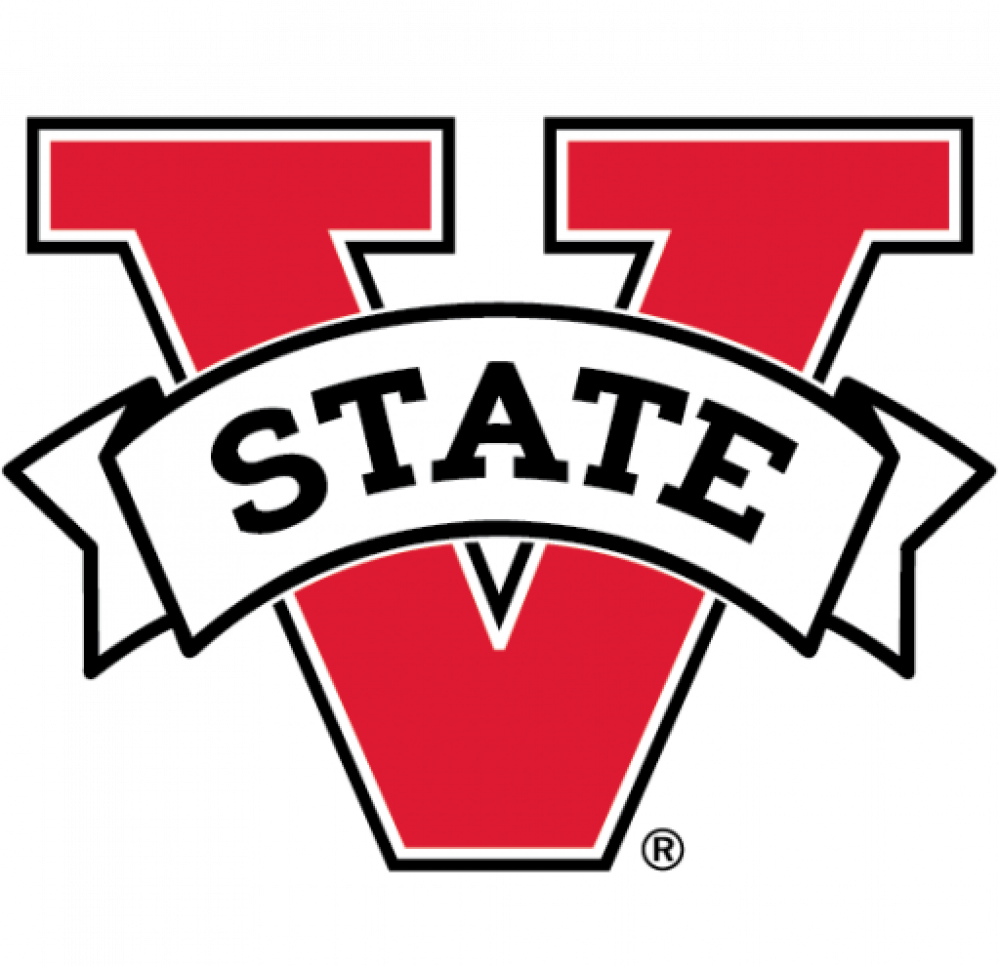
Updated June 2021
What is Experiential Learning?
Kolb describes experiential learning as “the process whereby knowledge is created through the transformation of experience. Knowledge results from the combinations of grasping and transforming the experience.”[1]
Examples of what could be considered experiential learning activities include:
- Community outreach
- Study-abroad or semester exchanges
- Career shadowing and mentoring
- Internships
- Undergraduate research or professional scholarship
- Leadership activities
- Creative activities and performances
**An expanded list with descriptions is discussed later in the document to provide additional guidance.
In Valdosta State University’s new Quality Enhancement Plan (VSU QEP), experiential learning is defined as:
Student application of theory, skills, techniques, and/or practices in a context that focuses on applications outside the traditional classroom but may also stem from a course assignment or project.
As identified by Kent State University, students who participate in experiential learning activities can obtain:
- A better understanding of course material
- A broader view of the world and an appreciation of community
- Insight into their own skills, interests, passions, and values
- Opportunities to collaborate with diverse organizations and people
- Positive professional practices and skill sets
- The gratification of assisting in meeting community needs
- Self-confidence and leadership skills[2]
Experiential Learning activities are designed to provide students with enhanced opportunities in applied research and problem solving in a practice setting. Successful learning projects require structures to formalize the activities and provide clarity to the project outcomes. Several concerns must be addressed before engaging in an experiential learning activity:
- Alignment of the activities to the intended course-based learning outcomes or organizational objectives (co-curricular activities);
- Careful planning about expectations, timeline, and reflections;
- Documenting the skills and knowledge that are being refined and developed;
- Oversight by a mentor, faculty member, or expert in the field or activity; and
- Finally, students must consider how the activities connect to education goals both short and long-term.
Experiential learning is a process through which students develop knowledge, skills, and values from direct experiences outside a traditional academic setting. Experiential learning encompasses a variety of activities including internships, service learning, undergraduate research, study abroad, and other creative and professional work experiences. Well-planned, supervised, and assessed experiential learning programs can stimulate academic inquiry by promoting interdisciplinary learning, civic engagement, career development, cultural awareness, leadership, and other professional and intellectual skills. Additionally, according to U.S. News & World Report, experiential learning can help students develop the “soft skills” that employers seek in new hires, who must learn to navigate the world of work as well as demonstrate task performance skills.[3]
As identified by the University of Colorado – Denver, learning that is considered “experiential” contains all the following elements:
- Reflection, critical analysis, and synthesis
- Opportunities for students to take initiative, make decisions, and be accountable for the results
- Opportunities for students to engage intellectually, creatively, emotionally, socially, or physically
- A designed learning experience that includes the possibility to learn from natural consequences, mistakes, and successes.[4]
Based upon existing research surrounding experiential learning, by participating in structured experiential learning opportunities, students can potentially engage the higher-level categories of Bloom’s Taxonomy of learning, including applying, analyzing, evaluating, and creating. As educators, we value the learning framework and find it necessary to measure student learning but also recognize that we need to package the stages of growth into a visual chart so students can more clearly understand. Therefore, the following Levels of Learning have been established for students, and the chart shown below further explains the correlation of each.

The Explore, Focus, Achieve slogan is also being used as a motto for the Experiential Learning initiative at VSU to further emphasize the mission of the QEP.
What are the Requirements for Experiential Learning Activities?
- Experiential Learning Activities must incorporate the four stages of Kolb’s Experiential Learning Cycle (more information is included below as a reference).
- Faculty and Staff must have clear goals and expectations for the Experiential Learning activities.
- Faculty and Staff must complete the Application for Courses or Programming with Experiential Learning form and submit it to the QEP Coordinator by the designated deadline.
Instructors and students take on specific roles as part of Experiential Learning activities. Instructors move to a facilitator role to guide students through the learning experience instead of directing each element of the process. Students become decision-makers in these experiences and self-evaluate throughout the process with the instructors acting as guides throughout the process. Instructors and students take on the following sets of tasks as indicated by Northern Illinois University:
- Instructors
- Be willing to accept a less teacher-centric role in the classroom.
- Approach the learning experience in a positive, non-dominating way.
- Identify an experience in which students will find interest and be personally committed.
- Explain the purpose of the experiential learning situation to the students.
- Share your feelings and thoughts with your students and let them know that you are learning from the experience too.
- Tie the course learning objectives to course activities and direct experiences so students know what they are supposed to do.
- Provide relevant and meaningful resources to help students succeed.
- Allow students to experiment and discover solutions on their own.
- Find a sense of balance between the academic and nurturing aspects of teaching.
- Clarify students’ and instructor roles.
- Students
- Students will be involved in problems which are practical, social and personal.
- Students will be allowed freedom in the classroom as long as they make headway in the learning process.
- Students often will need to be involved with difficult and challenging situations while discovering.
- Students will self-evaluate their own progression or success in the learning process which becomes the primary means of assessment.
- Students will learn from the learning process and become open to change. This change includes less reliance on the instructor and more on fellow peers, the development of skills to investigate (research) and learn from an authentic experience, and the ability to objectively self-evaluate one’s performance.[5]
Are there Assignments for Experiential Learning?
In alignment with Kolb’s four components of the experiential learning cycle, reflection is an essential part of the learning process. The reflection sections are sequentially completed at the point of the experience or activity.

Four Stages of Experiential Learning Cycle
- Concrete Experience: Individuals or groups complete an assigned activity.
- Reflective Observation: Individuals reflect on the ‘concrete experience’ to review what occurred during the activity and the experience itself.
- Abstract Conceptualization: Individuals reflect on previous experiences and develop observations about these experiences. “At this stage the learner makes comparisons between what they have done, reflect upon and what they already know. They may draw upon theory from textbooks for framing and explaining events, models they are familiar with, ideas from colleagues, previous observations, or any other knowledge that they have developed.”[6]
- Active Experimentation: Individuals begin the process of testing existing ideas by creating new experiences. “For learning to be useful most people need to place it in a context that is relevant to them. If one cannot see how the learning is useful to one’s life, then it is likely to be forgotten very quickly.”[6]
Sample Guiding Questions for Reflection at Each Stage of Experiential Learning Cycle
Concrete Experience
- Describe your activity.
- What made you choose this activity?
- What are your short and long-term goals related to this activity?
- How does this activity connect to one of the Honors outcomes listed above?
- What are the necessary skills for this activity?
- What are your notions of the work or activity ahead?
- What are some challenges you expect to encounter?
- Planning
- Keep a daily log of activities with specific comments about your observations
- Make careful notes concerning your expectations and the reality of the experience
- Plan to put these reflections in a document such as a paper, video, blog, etc.
Examples: “readings, examples/demonstrations, brief research projects, fieldwork, laboratories, basic experiments, film clips, problems/scenarios, observations, simulations, games, small group discussions, photographs/images, debates, practical exercises, creative exercises, etc.” [7]
Reflective Observation (should occur shortly after Concrete Experience)
- Academic
- Did you connect your experiences to one of the course learning outcomes? Which one?
- Can you find any articles or other materials related to practice, leadership, or experiences similar to yours?
- Did you have clearly identifiable goals that your review regularly?
- Career Development
- Did your activities relate to your future career goals?
- Did the activities provide you with group learning and collaborative opportunities? If so, how do you function in a group?
- What skills did you develop for your portfolio or resume?
- Observations
- Have your activities exposed you to new and unique opportunities, ideas, experiences?
- Did you find that this activity expanded your learning opportunities?
- Has less structured learning posed a challenge for you?
- Personal Reflections
- What items do you feel are most important to document from this experience?
Examples: “blogs, diaries, peer analysis and feedback, critiques, short reports, event summaries, journaling, brainstorming, rhetorical questioning”7
Abstract Conceptualization
Assessment
- What Course Learning Outcomes do you feel were successfully met by completing this experiential learning activity?
- What evidence can you provide to support your success?
- Do you have evidence of support from a supervisor, mentor, or faculty member?
- What reflections and/or other documentation can you provide to support successful outcomes?
- Has this experience changed your perspectives, goals, or career objectives in any way?
- Do you feel that you have a better understanding of leadership, teamwork, or collaboration?
Examples: projects, analogies, model creation/construction, theory propositions, concept mapping, summaries, sequencing facts/events, framing and explaining events7
Active Experimentation
- Are there any things that you would do differently?
- Will this experience assist you with future tasks?
- Are there lateral skills or ideas that presented opportunities for learning (such as collaboration, time management, and organization)?
- Kolb’s cycle represents ongoing development and learning, do you find that this process will be helpful in future/further experiences?
Examples: “case studies, role play, authentic games, problem solving, laboratories, fieldwork, simulations, authentic applications”[7]
Examples of Experiential Learning Activities for Different Subject Areas
General Examples of Experiential Learning as identified by the University of San Diego:
- Internship: a practical work experience at a company or organization where a student utilizes knowledge learned in the classroom in a profession setting.
- Undergraduate Research: research conducted on a university campus with the guidance and supervision of a faculty member.
- Career Related Community Service: a volunteer experience at an organization or facility that is related to career goals.
- Independent Study: an independent learning experience where a student is guided by an instructor to conduct a project but is not taking a course that they go to and attend.
- Clinical Experience: the observation or shadowing of a medical practitioner in order to learn and better prepare a student for the health care professional school of their choice.[8]
Additional Examples of Experiential Learning as identified by Northern Illinois University:
- Cooperative Education Experiences are more extensive than internships and will usually span two or more semesters of work. Co-ops are paid professional work experiences and are tied very closely to the student’s academic work. During the co-op experience students will receive ongoing advising and the co-op will be structured to meet the student’s academic and/or career goals. Co-op experience usually is included on a student’s transcript in addition to being awarded designated credit hours for its completion.
- Field Work Experiences allow students to explore and apply content learned in the classroom in a specified field experience away from the classroom. Field work experiences bridge educational experiences with an outside community which can range from neighborhoods and schools to anthropological dig sites and laboratory settings.
- Practicum Experiences are often a required component of a course of study and place students in a supervised and often paid situation. Students develop competencies and apply previously studied theory and content such as school library media students working in a high school library or marketing majors working in a marketing research firm. Practicum experiences also allow students to design and develop a project in which they apply knowledge and develop skills such as a doctoral student preparing the components of an online course.
- Student Teaching Experiences provides student candidates with an opportunity to put into practice the knowledge and skills he or she has been developing in the preparation program. Student teaching typically involves an on-site experience in a partner school and opportunities for formal and informal candidate reflection on their teaching experience.
- Study Abroad Experiences offer students a unique opportunity to learn in another culture, within the security of a host family and a host institution carefully chosen to allow the transfer of credit to a student’s degree program. Students studying a foreign language will perfect the accent and greatly expand their vocabulary–a skill retained for life. Making new friends, and travel and decision making, are also key parts of the study abroad experience.[5]
Here is a brief example of course-embedded activity that demonstrates the Four Stages of Experiential Learning provided by the University of Waterloo[9]
| Stage | Example |
| The learner has a “concrete experience.” | In a mechanical engineering course, students are asked to use 20 popsicle sticks to build a small bridge that will support 500 grams. |
| The learner makes observations and reflections based upon that experience. | Students note which popsicle sticks failed first, whether the sticks supported more when they were laid flat versus on their edges, and so on. |
| The observations and reflections are synthesized into a new conceptual understanding and interpretation of the experience. | Students develop a list of construction “principles” or best practices. |
| This conceptual understanding is applied and is used to guide new and purposeful experiences. | Students build another iteration of the bridge with the list of construction principles in mind. |
Explore the Experiential Learning Reflection Processes
Interested in Applying to Have an Experiential Learning Course Activity or Program Endorsed?

[1] Kolb, D. A. (1984). Experiential learning: Experience as the source of learning and development. Englewood Cliffs, NJ: Prentice-Hall.
[2] https://www.kent.edu/community/what-experiential-learning-and-why-it-important
[3] https://www.usnews.com/education/best-colleges/articles/2019-04-10/how-to-find-college-courses-that-teach-soft-skills
[4] http://www.ucdenver.edu/life/services/ExperientialLearning/about/Pages/WhatisExperientialLearning.aspx
[5] https://www.niu.edu/citl/resources/guides/instructional-guide/experiential-learning.shtml
[6] https://www2.le.ac.uk/departments/doctoralcollege/training/eresources/teaching/theories/kolb
[7] https://uthsc.edu/tlc/experiential-learning.php
[8] https://www.sandiego.edu/cas/student-resources/career-readiness-program/experiential-learning.php
[9] https://uwaterloo.ca/centre-for-teaching-excellence/support/integrative-learning/experiential-learning
